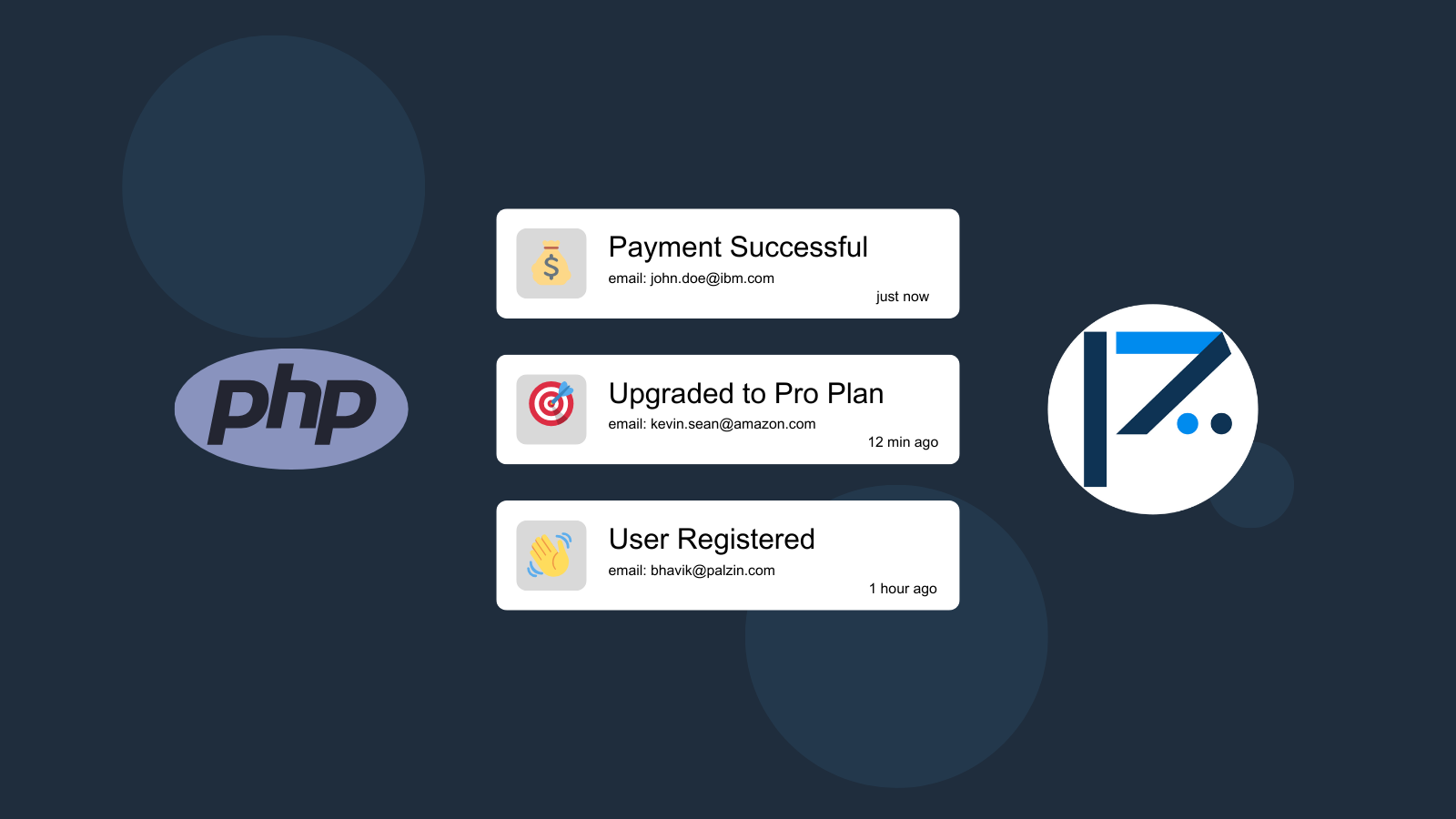
In most Php applications, user authentication is a fundamental requirement to control access, safeguard security, and prevent issues like API misuse. Authentication methods can vary, with common approaches including basic authentication, social logins (e.g., Google, Facebook), and more.
Irrespective of the chosen authentication method, dealing with failed login attempts is a frequent concern. Failures can result from incorrect credentials or other factors like login attempts by unauthorized users trying to breach the system. In such scenarios, it is essential to monitor and respond appropriately to failed login attempts. For instance, identifying users repeatedly struggling to log in may prompt us to offer assistance, while cases of brute-force attacks may require immediate actions such as IP address blocking, notifying the targeted user, and more.
Enter Palzin Track, our solution for effective monitoring and issue tracking. Palzin Track is a robust, real-time event tracking tool seamlessly integrated with Php. Setting up real-time event tracking for critical application aspects is made straightforward. Additionally, we offer advanced features for taking event tracking to the next level, including user journey creation, analytics, insights, and more.
Consider the example of handling failed logins. With Palzin Track, we can configure it to track failed login attempts and provide notifications when unusual activity is detected. This empowers us to maintain a constant vigilance over our application's security and take prompt action when necessary.
To track failed logins, you can use the following code snippet Please ensure to replace YOUR_API_TOKEN with your API token and update the project and channel names.
Using PHP with cURL
<?php
$curl = curl_init();
curl_setopt_array($curl, array(
CURLOPT_URL => 'https://api.palzin.live/v1/log',
CURLOPT_RETURNTRANSFER => true,
CURLOPT_ENCODING => '',
CURLOPT_MAXREDIRS => 10,
CURLOPT_TIMEOUT => 0,
CURLOPT_FOLLOWLOCATION => true,
CURLOPT_HTTP_VERSION => CURL_HTTP_VERSION_1_1,
CURLOPT_CUSTOMREQUEST => 'POST',
CURLOPT_POSTFIELDS =>'{"project":"my-project","channel":"status","event":"Failed Login Attempt","description":"Detected 3 failed login attempts in the last 5 minutes","icon":"⚠️","notify":true}',
CURLOPT_HTTPHEADER => array(
'Content-Type: application/json',
'Authorization: Bearer YOUR_API_TOKEN'
),
));
$response = curl_exec($curl);
curl_close($curl);
echo $response;
Using PHP with Guzzle
<?php
$client = new Client();
$headers = \[
'Content-Type' => 'application/json',
'Authorization' => 'Bearer YOUR_API_TOKEN'
\];
$body = '{
"project": "my-project",
"channel": "status",
"event": "Failed Login Attempt",
"description": "Detected 3 failed login attempts in the last 5 minutes",
"icon": "⚠️",
"notify": true
}';
$request = new Request('POST', 'https://api.palzin.live/v1/log', $headers, $body);
$res = $client->sendAsync($request)->wait();
echo $res->getBody();
Using PHP with HTTP_Request2
<?php
require_once 'HTTP/Request2.php';
$request = new HTTP_Request2();
$request->setUrl('https://api.palzin.live/v1/log');
$request->setMethod(HTTP_Request2::METHOD_POST);
$request->setConfig(array(
'follow_redirects' => TRUE
));
$request->setHeader(array(
'Content-Type' => 'application/json',
'Authorization' => 'Bearer YOUR_API_TOKEN'
));
$request->setBody('{"project":"my-project","channel":"status","event":"Failed Login Attempt","description":"Detected 3 failed login attempts in the last 5 minutes","icon":"⚠️","notify":true}');
try {
$response = $request->send();
if ($response->getStatus() == 200) {
echo $response->getBody();
}
else {
echo 'Unexpected HTTP status: ' . $response->getStatus() . ' ' .
$response->getReasonPhrase();
}
}
catch(HTTP_Request2_Exception $e) {
echo 'Error: ' . $e->getMessage();
}
Using PHP with pecl_http
<?php
$client = new http\Client;
$request = new http\Client\Request;
$request->setRequestUrl('https://api.palzin.live/v1/log');
$request->setRequestMethod('POST');
$body = new http\Message\Body;
$body->append('{"project":"my-project","channel":"status","event":"Failed Login Attempt","description":"Detected 3 failed login attempts in the last 5 minutes","icon":"⚠️","notify":true}');
$request->setBody($body);
$request->setOptions(array());
$request->setHeaders(array(
'Content-Type' => 'application/json',
'Authorization' => 'Bearer YOUR_API_TOKEN'
));
$client->enqueue($request)->send();
$response = $client->getResponse();
echo $response->getBody();
We believe that event tracking should be simple and accessible to every developer and team. Therefore, we have worked hard to create the next generation of event-tracking tools. As a result, Palzin Track is flexible and easy to use, making it a great companion for your PHP applications.
We would love to see you use Palzin Track to track every aspect of your PHP application. So please give us a try and let us know what you think!
Palzin Track reveals the human stories behind your data. Make user-centric decisions that drive growth.